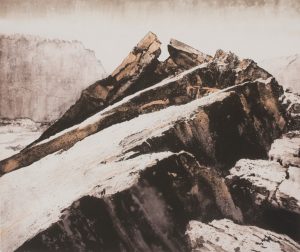Earth: Digging Deep in British Art 1781-2022 is a major exhibition spanning four centuries of artwork, at the Royal West of England Academy’s (RWA) newly refurbished galleries this summer. The final instalment of the RWA’s elements series, Earth tackles the most expansive and urgent of subject matters, bringing together important modern, historical and contemporary artworks.
Earth examines how attitudes towards the landscape have evolved over the centuries and how artists’ approaches have changed over time; from the pastoral idylls of the 1700s, through to present-day confrontations of the climate emergency. Encompassing depictions of the natural world from geological, spiritual, industrial, cultural and scientific perspectives.
This exhibition goes deep beneath the earth, exposes the core materiality of its elements, explores the substance of the surface, climbs dizzying heights and perches perilously on its edges. It bears witness to the earth’s mistreatment and its magnificence, its fullness and its fragility. Earth surveys the representation of our environment across four centuries, inviting us to consider our planet in all its abundance, precarity and preciousness.
Earth is co-curated by artist Emma Stibbon (RA RWA and University of Brighton). Emma, who’s artwork focusses on the natural world, in particular glacial and volcanic environments, says “from the abundance and wonder of our planet the exhibition takes us to the critical question of its fragility and precariousness, confronting us with our impact on the Earth – surely the most critical issue of our time”. The exhibition also displays nine thin section microscope slides of ice(berg)-keel scoured sediments from Canada and Greenland, lent to the RWA by Dr Lorna Linch (University of Brighton). Lorna, who’s primary research interests are glacial and periglacial processes and landforms, says “I am interested in how science can be expressed through art and how art may inspire science, so collaborating with Emma on this exhibition was the perfect opportunity to explore that. It is essential we figure out ways to communicate the current climate crisis to wider audiences – and merging art with science is one of those ways”.
Artists include J.M.W. Turner, John Constable, Thomas Gainsborough, Graham Sutherland and Laura Knight alongside contemporary artists Richard Long, David Nash, Anya Gallaccio, Yinka Shonibare, Mariele Neudecker, Tania Kovats and more. The exhibition runs from the 9 July – 11 September 2022.

Broken Terrain (67.5 x 80 cm), by Emma Stibbon. “I made Broken Terrain in response to a residency on Big Island, Hawaii where I stayed on the rim of Kīlauea, one of the world’s most active volcanoes. It depicts the broken lava pavement of Kīlauea Iki, a side eruption to the main volcano crater. Walking on this unstable crater floor felt precarious and the ground was literally hot beneath my feet. Whilst out walking I gathered volcanic ash to incorporate with my drawing media to create a tactile surface in the print – I wanted to give a sense of the elemental terrain in the physical surface of the work.”

A thin section microscope slide (6 x 8 cm) of iceberg-keel scoured clays and silts retrieved from former Glacial Lake Agassiz (Manitoba, Canada), collected, processed and analysed by Dr Lorna Linch. “Here we can see that the upper clay and silt layers have been deformed and realigned in response to the stresses imposed by the scraping and scouring of a forward moving iceberg through the sediments on the lake bed. Detailed observations of Earth’s geological materials such as these are extremely useful for reconstructing past glacial events and the dynamics of former ice sheets, as well as wider environmental reconstruction such as identifying water bodies deep enough for wind and currents to drive ice floes forward during ice/bed interaction.”

Published by